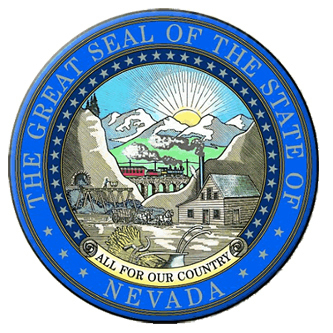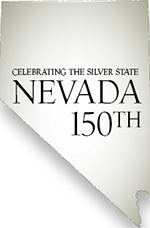When it comes to Nevada’s state motto, confusion is born
You may know it as the Silver State. You may even consider it “Battle Born.” But neither of those well-worn phrases — not even the one printed on the state flag — is Nevada’s official motto.
For that, you need to consult the fine print on The Great Seal of the State of Nevada, or journey back almost 150 years to its origin.
On February 24, 1866, the fledgling Nevada Legislature officially changed the motto on the seal to “All for Our Country,” replacing the territorial motto of “Volens et Potens,” which is Latin for “Willing and Able.”
By law, the motto appears near the bottom of the state seal on a yellow band surrounded by 36 stars that signify Nevada’s place as the 36th state to join the Union.
Nevada state archivist Jeff Kintop said the state’s founding fathers were “pushing around a number of ideas” for mottoes during Nevada’s first constitutional convention in 1863. Among them was a decidedly political message: “The Union Must and Shall Be Preserved.”
No historical record has been found documenting why “All for Our Country” was selected, but it probably had as much to do with when it was selected as anything.
“The motto essentially states that Nevada, first and foremost, would give all its allegiance to the United States,” said Guy Rocha, Nevada’s former state archivist.
That sentiment has been challenged over the decades by some Nevada residents — most recently rancher Cliven Bundy. But at the time of its adoption, the state’s motto sent a strong message to a wounded nation only a few months removed the Civil War.
And without that war, the territory would not have become a state, at least not as early as it did.
Though many believe it was Nevada’s mineral wealth that prompted statehood, what President Abraham Lincoln was really after was votes, Kintop said.
Lincoln was running for election in 1864 and was not confident he would win. The war had not gone well, and Lincoln was being challenged by Gen. George McClellan, who also supported the North and organized the Union army.
The president worried he might need a few more electoral votes, so eight days before the election, Nevada became the 36th state in the Union.
As it turned out, Lincoln won re-election handily, but a bigger fight was looming. The 13th Amendment, to end slavery, faced a tight vote in Congress. Adding Nevada, a free state, to the Union would guarantee another vote in the amendment’s favor.
Because of Nevada’s inextricable ties to the Civil War, people still commonly mistake “Battle Born” as the state motto, Rocha said. It doesn’t help that the nickname appears on the state flag and has been in use just as long as the actual motto.
Thomas Fitch, who would go on to represent Nevada in Congress, is credited with coining the term “battle born” during Nevada’s second constitutional convention, in 1864. The official state seal was selected at the same convention.
Battle Born is “about as old as ‘All for Our Country,’” Rocha said, “and I suspect the confusion is just as old.”
Review-Journal writer Kristy Totten contributed to this report. Contact Henry Brean at hbrean@reviewjournal.com or 702-383-0350. Find him on Twitter: @RefriedBrean.





























